Norman Hall renovations project jumps on fast track
It’s too soon to don a hard hat, but excitement is building as design plans for a top-to-bottom makeover of Norman Hall begin to take shape.
It’s too soon to don a hard hat, but excitement is building as design plans for a top-to-bottom makeover of Norman Hall begin to take shape.
U.S. News and World Report rated the distance education program at the University of Florida College of Education as America’s best online graduate education degree program for the second consecutive year.
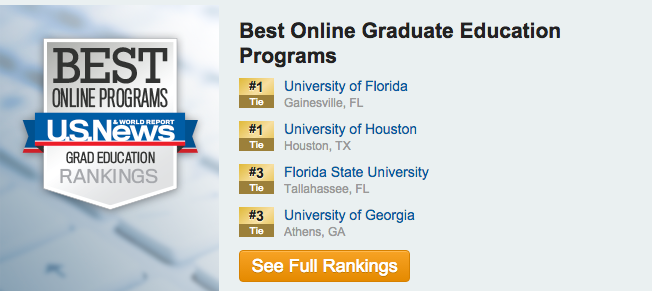
GAINESVILLE, Fla. – The distance education program at the University of Florida College of Education, already recognized for having some of the nation’s best e-learning students, now can stake a claim as America’s best online graduate education degree program overall, according to the latest national rankings announced Jan. 12 by U.S. News and World Report magazine.
UF was tied for first with the University of Houston in the new 2016 rankings of America’s Best Online Graduate Education Programs, improving by 12 spots over last year. For the second year in a row, UF also received the survey’s highest score for “admissions selectivity”—considered an indicator of the high quality of its students.
UF now is the top-ranked education college in Florida and among public education schools in the Southeast in both online and on-campus graduate degree programs. The College of Education also was UF’s highest-rated online program in the survey.
This is the fifth year that U.S. News has numerically ranked online learning programs in higher education. Education is one of seven disciplines at the master’s degree level that were rated. Programs were ranked based on five weighted factors: student engagement (35%), student services and technology (20%), admissions selectivity (15%), faculty credentials and training (15%), and peer reputation (15%).
“Our distance ed courses are designed by top-flight faculty using the latest knowledge about best practices in web-based learning environments,” UF education Associate Dean Tom Dana said. “Our goal is to develop master educators who can lead transformations in practice.”
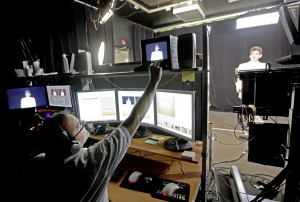
COE online instructors work with the college’s instructional design creative teams to produce high-quality videos, both for on-screen lessons and “virtual field trips” (Photo courtesy of Matt Stamey/The Gainesville Sun)
Dana said a key distinction of the UF online program is its cohort instructional approach, meaning the students start and complete the degree coursework together, which Dana said creates more opportunities for students to interact with each other and with their instructors.
“The cohort model has been shown to increase student retention and the graduation rate,” he said.
Dana has steered the development of the college’s e-learning program since its inception in 2004, when 57 students enrolled in three online graduate courses. In 2015, more than 1,750 students were enrolled in 160 online courses.
The College of Education offers eight Web-based degree programs, geared mainly to working teachers and school administrators seeking additional certifications, career advancement or professional development. The five online graduate education programs considered in the U.S. News rankings were: curriculum and instruction; educational leadership; educational technology; reading, language and literacy; and special education.
“Many of our online instructors are full-time college faculty members and nationally recognized as experts in their field,” Dana said. “All online instructors receive training in the technology and best practices of online learning.”
Many instructors have worked with the college’s instructional design team and digital creative staff to produce high-quality videos, both for on-screen lessons and for “virtual field trips” that allow students to see and hear some of Florida’s most inspiring teachers and school administrators in action and discussing best practices and professional insights.
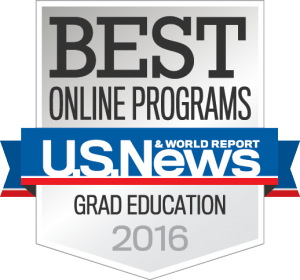 “The videos link to a specific assignment or learning activity,” said Bruce Mousa, coordinator of UF’s educational leadership online degree program. Mousa also has been known to upload videos from his personal computer to provide feedback to individual students.
“The videos link to a specific assignment or learning activity,” said Bruce Mousa, coordinator of UF’s educational leadership online degree program. Mousa also has been known to upload videos from his personal computer to provide feedback to individual students.
Education Professor Sevan Terzian even incorporates some Ken Burns-like production techniques to deliver engaging content in his Education and American Culture online course, such as inserting historical images accompanied by captions and his voice-over narration.
“I wouldn’t be the first to say there is a small element of performance in everything we do,” Terzian said with a smile.
For more information, visit the college’s distance learning website at https://education.ufl.edu/distance-learning/.
The full rankings and rankings data for Best Online Programs in Graduate Education are publicly posted on the U.S. News website at http://www.usnews.com/education/online-education/education.
SOURCE: Tom Dana, associate dean, UF College of Education; tdana@coe.ufl.edu; 352-273-4134
SOURCE: Jason Arnold, associate direct of e-learning, technology and creative services, UF College of Education; jda@coe.ufl.edu; 352-273-4442
WRITER / MEDIA RELATIONS: Larry Lansford, communications director, UF College of Education; llansford@coe.ufl.edu; 352-273-4137
The School District of Palm Beach County, together with the University of Florida, has announced the launch of a three-year reform effort to build a “best-in-class” educational program in the vital STEM subject areas of science, technology, engineering and math.
Officials say the ambitious effort could become a national model for transforming teacher practice and student learning in the STEM subjects. The resulting professional development and educational advances will directly benefit thousands of teachers and students in the Palm Beach County district.
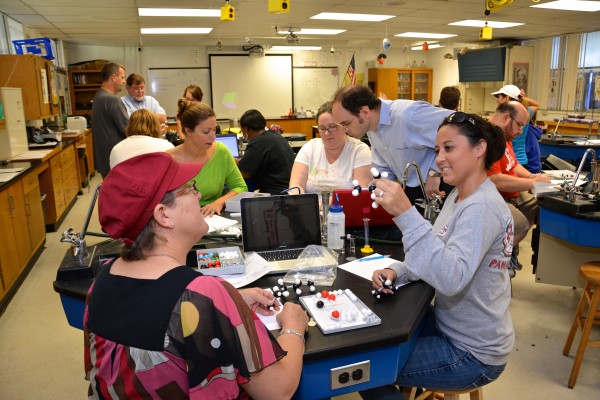
Palm Beach County science teachers construct an atom model at a UF Summer Institute on chemistry instruction recently at UF’s P.K. Yonge Developmental Research School.
Major funding support for the STEM initiative’s rollout comes from $1 million in combined grants from three charitable foundations—the Community Foundation for Palm Beach and Martin Counties, the Mary and Robert Pew Public Education Fund and Quantum Foundation. Additional funding is projected with amounts to be considered before the effort’s second and third years.
UF has worked with the school district and its community and philanthropic partners in planning the initiative, and will provide “in-kind” professional development and educational programs valued at more than $1 million—funded primarily by additional state and national foundation grants held by UF’s College of Education
UF and school district officials expect the Palm Beach County STEM Initiative to yield measurable improvement in four key areas: school culture, teacher quality, student learning, and higher performance and assessment evaluations in the STEM subjects for teachers and students. Certain programs are designed especially for schools in high-poverty communities where recruiting and retaining teachers is more challenging
“This bold initiative will position the Palm Beach County school system as a national leader in recruiting, retaining and developing highly effective teachers and boosting students’ achievement,” said Dean Glenn Good of UF’s College of Education.
Palm Beach County School Superintendent E. Wayne Gent said, “With the ever increasing importance of STEM-related jobs in Florida, the (school district) is dedicated to equipping our teachers with the resources they need to educate the future STEM leaders of tomorrow. We are grateful to our partners at the University of Florida, along with the generosity of our key foundation partners, who made this program a reality.”
UF’s College of Education brings several existing STEM education innovations to the partnership. The college’s Lastinger Center for Learning will provide job-embedded professional learning opportunities to district science and math teachers, and the center’s free, online Algebra Nation tutoring program (launched last year in numerous Florida school districts) supports students and their teachers preparing for a required algebra end-of-course exam.
Through an outreach program called U-FUTuRES — or UF Unites Teachers to Reform Education in Science — university professors will train middle-school Science Teacher Leaders to lead districtwide implementation of research-proven teaching practices and subject content. The education college also will provide tuition-free courses to 15 Palm Beach County teachers for a certification program in math or science education that they can take without leaving their classrooms. UF launched U-FUTuRES last year in 20 mostly rural Florida school districts under a $5 million grant from the National Science Foundation.
Another new UF program is Florida STEM-TIPS (Teacher Induction and Professional Support), which will have education faculty developing coaching, mentoring and networking programs for new science and math teachers in Palm Beach County.
Other components of the UF-Palm Beach Schools STEM initiative include:
WATCH NOW on the COE YouTube channel. CLICK HERE: http://goo.gl/J6JCje
A college student’s typical summer often includes lounging by a pool, spending hours glued to technology and social media, and sleeping until noon.
For recipients of the University of Florida’s Noyce summer scholarships, however, vacation days this summer were spent soaked in science teaching and learning.
Noyce summer scholars are enrolled in the university’s UFTeach program, a collaborative effort between the colleges of Education and Liberal Arts and Sciences that provides math and science majors with an education minor to prepare them for teaching the STEM subjects of science, technology, engineering and math. During the summer, each scholar serves as an intern at an informal science education setting, such as a museum, zoo, botanical park, fossil dig or nature center.
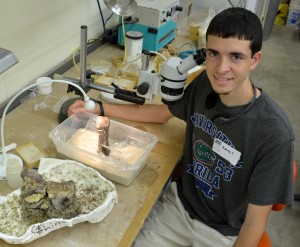
UFTeach Summer Scholar Barry Congressi prepares a rhinoceros vertebrae fossil for display at the Florida Museum of Natural History in Gainesville.
“Today’s students need a much stronger foundation in STEM subject areas beginning in middle and high school, and teachers have one of the most significant impacts on student learning,” said UFTeach associate director Dimple Flesner. “It is critical that mathematics and science teachers have a strong academic background in the subjects they teach. UFTeach answers this call.”
As part of a five-year, $1.2 million grant, the National Science Foundation’s Robert Noyce Teacher Scholarship Program will fund 18 UFTeach scholars every summer with a $5,000 stipend, as well as 10 additional students each school year with $10,000. The Noyce program funds higher-education institutions across the country to support scholarships, stipends and academic programs for STEM majors who pursue a teaching credential and commit to teaching at least two years in high-needs public school districts.
“We hope our Noyce interns will discover the value and importance of informal education settings and begin to see the world as their classroom,” said Flesner, a co-principal investigator of UF’s Noyce internship project along with UFTeach co-director Tom Dana, an associate dean at the College of Education.
UF senior math major Barry Congressi, one of this year’s 18 summer scholars, mathematics major has been working at the Florida Museum of Natural History on UF’s Gainesville campus. He is stationed at the museum’s vertebrae paleontology unit, where he cleans and prepares fossils for display.
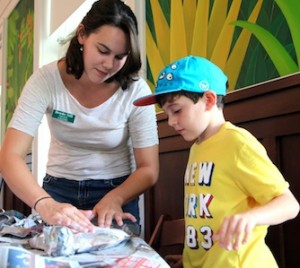
Summer scholar Brooke Still helps a camper on his art project at Miami’s Fairchild Tropical Botanic Garden.
Although Congressi is studying mathematics, he said his Noyce internship has been both a personal and professional learning experience.
“Not only have I really learned a lot about paleontology in the last couple of months, but I have discovered that I can find inspiration for mathematics lessons anywhere and almost anything can be used to help teach others,” he said.
Junior Brooke Still is also a math major working within a science environment. She is an intern at Miami’s Fairchild Tropical Botanic Garden and its butterfly conservatory. Each day, Still either works with children participating in Fairchild’s summer camp, or she interacts with and educates guests at the butterfly conservatory.
Her experience, she said, has taught her practical skills that are necessary in the classroom. One of these is patience.
“Without patience, you can’t successfully motivate your students or guide their learning,” she said.
Also in Miami is sophomore Caguetzia Soulouque, who has spent her summer afternoons coordinating field trips and planning fun, informative and memorable lessons for young visitors at the Jungle Island zoo. She also was working to develop an educational curriculum for the zoo’s field trip visitors and its potential future summer camp.
“Through this experience I’ve learned a lot about what learning opportunities children are receiving and aren’t receiving in schools, as well as how I can use Jungle Island and similar places as a teaching resource,” Soulouque said. “It’s summer and kids don’t want anything to do with school, so I’ve had to learn how to make lessons that are entertaining yet educational.”
Senior Shivee Gupta, a zoology major interning at the Florida Museum of Natural History, is also finding ways to make science fun but still challenging. Her workdays involve creating videos and exhibits for visitors and educators about subjects like invasive species, animal attacks and beach bird nests.
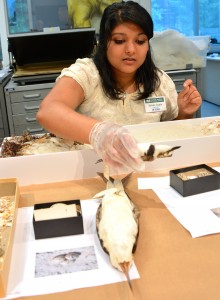
UFTeach zoology major Shivee Gupta prepares a beach bird nest display at the Florida Museum of Natural History.
“The main challenge we have as educators is how we get a message across to our students and to the public that is understandable,” Gupta said. “Through my internship and the class that goes with it, I’ve learned how to take scientific knowledge and present it in a way so everyone can understand it without ‘losing’ the science.
The NSF’s Noyce scholarship program is just one of several recent initiatives by the College of Education to bolster teaching and learning in the STEM subjects. Each of the selected Noyce scholars recognizes the need for more STEM majors and teachers in this global knowledge economy.
For intern Brooke Still, it all begins with “better informed and more passionate STEM teachers who motivate their students to learn, resulting in students who are genuinely more interested in STEM subjects,” she said.
“Our world revolves around STEM subjects,” Gupta added. “Everything you do and see has some science or math incorporated. Students need to begin to see a holistic view of the world and STEM education really brings that together.”
CONTACT
WRITER: Alexa Lopez, news and communications, UF College of Education, 352-273-4449
MEDIA CONTACT: Larry Lansford, director, news and communications, UF College of Education, 352-273-4137
Independent Florida Alligator, Gainesville Sun
1-30-13, 2-4-12
National Science Foundation scholarships
The Independent Florida Alligator and the Gainesville Sun wrote articles about a $1.2 million National Science Foundation grant that was awarded to the College of Education to fund scholarships for STEM majors in the UFTeach program. Tom Dana and Dimple Flesner were quoted in the reports.
GAINESVILLE, Fla. — Some experts are challenging the widespread notion of an overall worker shortage in the STEM fields of science, technology, engineering and math, but the paucity of schoolteachers in those vital subject areas is well documented.
That’s why the University of Florida has heightened emphasis on attracting more qualified STEM majors into the teaching ranks. The latest milestone is a $1.2 million grant from the National Science Foundation announced Monday by UF officials. The five-year funding allows UF’s College of Education to start offering major scholarship support and hands-on training opportunities this semester to recruit and prepare top science and math majors for teaching careers, mainly in Florida’s neediest middle and high schools.
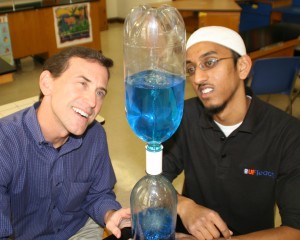
UF science education instructor Griffin Jones helps UFTeach student Ibn Ali in an experiment. (UFCOE file staff photos by Larry Lansford)
The NSF Robert Noyce Teacher Scholarship Program funds higher-education institutions to support scholarships, stipends and academic programs for STEM majors who pursue a teaching credential and commit to teaching at least two years in high-needs public school districts.
Over the next five years, UF will award Noyce scholarships worth $10,000 each to 50 undergraduate students enrolled in a program called UFTeach, which uses imaginative recruiting strategies to attract some of the university’s best students and exposes them to teaching through intensive, supervised classroom experiences in high-poverty schools. UFTeach is a joint effort of the colleges of Education and Liberal Arts and Sciences.
Enrolled students continue their science or math major while also pursuing a minor in education and most of the professional educator requirements. The scholarships will usually kick in for selected students during their senior year, when most UFTeach students serve their semester-long, full-time internship in a middle or high school science or math class.
“The senior year can be difficult for UFTeach students. The classroom-based apprentice-teaching course demands significant student time and attention. The Noyce scholarships will allow the students to focus on their apprenticeships in the classroom and ease their financial concerns,” said UF science education professor Tom Dana, the co-director of UFTeach and the principal investigator of the NSF-backed effort, which UF has dubbed the STEM EduGators program. “EduGators” is a traditional nickname for students, alumni and other stakeholders of the College of Education.
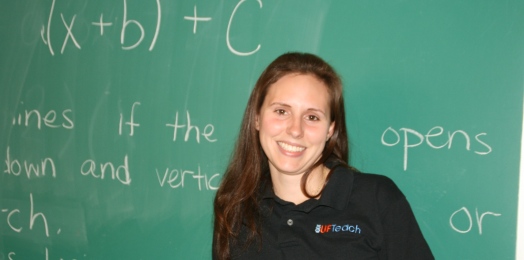
UF COE master mathematics teacher Gloria Weber assists UFTeach student Heather MacNeill in an exercise.
Another 90 UFTeach students, or 18 per year, will each receive stipends of nearly $5,000 while serving summer internships in informal science education settings such as the Florida Museum of Natural History at UF, zoos, botanical parks and nature centers. Interns must first attend an orientation and “boot camp” promoting learning in informal education settings.
“The informal teaching experience will help interns build their toolkit of ideas and teaching strengths and help them develop strategies for engaging a wide variety of learners in their classrooms,” said UFTeach associate director Dimple Flesner, the co-principal investigator of STEM EduGators. “This type of awareness and insight cannot be easily gained in the traditional settings in which teachers learn.”
Flesner said the interns also will participate in a mentored STEMS EduGator online community of students, faculty and staff to share insights, concerns and “aha moments” they experience during their summer internships.
She said the grant also pays for hiring staff, research and program evaluation, travel for interns, recruitment promotion and overhead expenses.
The NSF-Noyce scholarship program is just the latest initiative the College of Education has launched to bolster teaching and learning in the STEM subjects. The UFTeach program received a state workforce policy board’s Best Practices Award in 2011 for its role in addressing the critical shortage of math and science teachers. The newest NSF project follows on the heels of a $2 million state grant awarded to the college last October to create prototype “teacher induction” programs to support Florida science and math teachers in their first two years on the job.
An earlier NSF grant in 2011 pairs the College of Education with its K-12 laboratory school, P.K. Yonge Developmental Research School, in a $5 million campaign to boost student achievement in middle schools by improving science content knowledge among practicing teachers.
“Teachers have the greatest impact on student learning. Our country’s future success in this global economy requires college graduates who are literate in science, math and technology and can drive innovation, lead scientific discoveries and become engaged, informed citizens,” Dana said. “This means providing students with a much stronger foundation in the STEM subjects beginning in middle and high school.”
CONTACTS
Source: Tom Dana, UF College of Education, tdana@coe.ufl.edu, 352-273-4134
Source: Dimple Flesner, associate director, UFTeach, dimple@ufl.edu, 352-273-4189
Writer: Larry Lansford, news and communications, UF College of Education; llansford@coe.ufl.edu; 352-273-4147
The College of Education at the University of Florida is one of two UF colleges with online master’s degree programs rated first in the state and in the top 20 nationally in their respective specialties, according to rankings announced Jan. 15 by U.S. News & World Report.
 The College of Education’s distance learning program ranked 18th in the magazine’s 2013 Best Online Graduate Education Programs reference guide, higher than any other Florida education college. Campuswide, only the Hough Graduate School of Business ranked higher, placing fourth in its specialty. Other top UF performers were the College of Engineering at 26th and UF’s online bachelor’s degree programs at 34th.
The College of Education’s distance learning program ranked 18th in the magazine’s 2013 Best Online Graduate Education Programs reference guide, higher than any other Florida education college. Campuswide, only the Hough Graduate School of Business ranked higher, placing fourth in its specialty. Other top UF performers were the College of Engineering at 26th and UF’s online bachelor’s degree programs at 34th.
This is the second year that U.S. News has collected data on distance learning programs in higher education. U.S. News ranks education programs based on wide-ranging criteria that includes admissions selectivity, student services and engagement, technology, and faculty credentials.
“Our online education courses are designed by top-flight faculty using the latest knowledge about best practices in web-based learning environments. Our goal is to develop master educators who can lead transformations in practice,” said Tom Dana, COE associate dean for academic affairs.
He said “the feature that sets our online programs apart” is a cohort instructional approach with extensive student-to-student and student-to-teacher interaction.
Dana has steered the development of UF’s online education program since its inception in 2004, when 57 students enrolled in three graduate distance-learning courses. The program has grown exponentially.
In the 2011-12 academic year, nearly 1,200 individual students took online courses at the College of Education, including all advanced degree programs, generating more than 3,300 total enrollments and nearly 10,000 credit hours. The college offered 114 fully online courses and nearly 280 “blended” courses, mixing online and face-to-face instruction.
“The emphasis on student engagement makes this ranking particularly rewarding because we strive to integrate innovative instructional approaches that best take advantage of how adults learn in online environments,” said Kara Dawson, who coordinates the College’s education technology program.
The College’s distance learning program brings together diverse and far-ranging students from around the world. According to Dan McCoy, senior director of e-learning and technology at the college, online students last year ranged in age from 18 to 65 and hailed from six countries, 25 states and some 200 Florida cities and towns.
The College offers three online master’s degrees: teacher leadership for school improvement (TLSI), education technology and Teach Well (teaching students with disabilities). The job-embedded TLSI program won the national Association of Teacher Educators’ 2011 Distinguished Program in Teacher Education Award.
“We’ve been able to attract the best and brightest students to our online programs. We provide world-class faculty who have embraced online education as a way to be innovative in their teaching and increased access to students working in the field,” McCoy said. “Our online support staff work tirelessly to ensure that students can enjoy the best education our college can offer while helping them to feel at home as members of the College of Education academic family.”
U.S. News is not publishing a printed guidebook for the online rankings, but does plan to include highlights in the 2014 guidebooks for Best Graduate Schools and for Best Colleges.
You can view the complete online graduate education rankings and accompanying data on the U.S. News website at www.usnews.com/online-education.
CONTACTS
SOURCE: Tom Dana, associated dean for academic affairs, UF College of Education, tdana@coe.ufl.edu, 352-273-4134
SOURCE: Dan McCoy, senior director for e-learning, technology and creative services, UF College of Education, dmccoy@coe.ufl.edu, 352-273-4134
WRITER: Larry Lansford, director, news and communications, UF College of Education; llansford@coe.ufl.edu; 352-273-4137
GAINESVILLE, Fla. — UF Teach, a novel program considered to be the pillar of the UF College of Education’s science and math education reform strategy, will split $500,000 in support from AT&T with four other universities with similar programs, according to an announcement Jan. 19 by the National Math and Science Initiative.
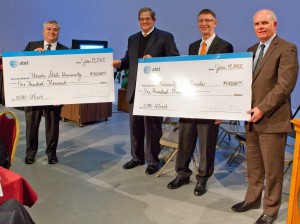
From left: FSU President Eric Barron; Marshall Criser III, AT&T Florida President and UF trustee; Glenn Good, dean of the UF College of Education; and UF President Bernie Machen pose with oversized checks from AT&T.
The five benefiting programs, all modeled after the highly regarded UTeach program at the University of Texas at Austin, will each receive $100,000. AT&T presented awards to UF Teach and to model programs at the University of California at Berkeley, the University of California at Irvine, the University of Northern Arizona and Florida State University.
“AT&T deserves tremendous credit for its foresight in recognizing the growing importance of math and science education,” UF President Bernie Machen said. “If you want to get students interested in those fields, you have to reach them early. This gift is a long-range investment that will help the University of Florida graduate the teachers that are needed to keep our state and our nation economically competitive for years to come.”
UF Teach is a collaboration between the university’s College of Education and the College of Liberal Arts and Sciences, and the goal is to recruit the best math and science majors and prepare them to teach effectively. Master science and math teachers from the education college induct the students into the community of teachers by showing them the most effective, research-proven teaching methods in the given content areas and exposing them to supervised classroom experiences with schoolchildren beginning in their first semester.
The program, in its fourth year, offers education minors for their efforts in hopes the students will teach. Their degrees qualify them for teaching certification in Florida schools. Tom Dana, associate dean for academic affairs at the College of Education, co-directs UF Teach with Alan Dorsey, a physics professor and an associate dean in the College of Liberal Arts and Sciences.
The first UF Teach class of 41 students enrolled in 2008, and enrollment jumped to 224 last spring. UF officials project that by 2015, UF Teach will graduate more than 60 students yearly who will be certified, and highly qualified, to teach middle and high school math and science in Florida schools. Dana said the number of math and science students in Florida served by UF Teach graduates should top 25,000 by 2015 and continue to grow exponentially each year.
NMSI has partnered with the UTeach Institute to implement the path-breaking program for recruiting and preparing math and science teachers in universities across the country since 2008 and is helping expand the program to 28 universities this fall. Enrollment in UTeach-modeled programs has tripled in the last three years, attracting more than 5,000 math and science majors across the country this fall.
“AT&T is acutely aware that our country needs more skilled workers in the critical fields of science, technology, engineering and math,” said Marshall Criser III, AT&T Florida president and UF trustee. “All Americans will need to be more STEM proficient to be competitive in the 21st century.”
UTeach originated at The University of Texas at Austin in 1997. The program enables students majoring in math, science, or computer science to receive full teaching certification without adding time or cost to their degrees.
The core elements of UTeach model programs include:
The National Math and Science Initiative was launched in 2007 by top leaders in business, education, and science to reverse the decline in American math and science education. Inaugural funding was provided by the Exxon Mobil Corporation, the Bill & Melinda Gates Foundation and the Michael & Susan Dell Foundation.
CONTACT: Larry Lansford, director, news & communications, UF College of Education, 352-273-4137; llansford@coe.ufl.edu
GAINESVILLE, Fla.—UF-Teach, an innovative teacher-preparation program that recruits some of the University of Florida’s top science and mathematics majors into the teaching profession, recently received STEMflorida’s Best Practices Award for excellence and accountability in targeted STEM teacher recruitment and retention efforts.
STEMflorida is a business-led statewide council created in 2009 by Workforce Florida, the state’s workforce policy and oversight board. (STEM is common shorthand for the technical disciplines of science, technology, engineering and mathematics, considered vital workforce skills in today’s competitive global marketplace.)
The award was presented recently during the STEMflorida Think Tank meeting in Orlando and recognized the UF Teach program’s role in addressing the critical shortage of math and science teachers in Florida.
UF-Teach is a collaboration between UF’s College of Education and the College of Liberal Arts and Sciences, and the goal is to recruit the very best math and science majors and prepare them to teach effectively. The program is funded by a $2.4 million grant over five years from the National Math and Science Initiative and a $1 million endowment from the Helios Education Foundation based in Tampa.
“In UF-Teach, we have master science and math teachers who induct the students into the community of teachers by showing them the most effective, research-proven teaching methods in the given content areas and exposing them to supervised classroom experiences with schoolchildren beginning in their first semester,” said Tom Dana, associate dean at UF’s College of Education and co-coordinator of UF Teach with physics professor and associate dean Alan Dorsey of the College of Liberal Arts and Sciences.
The program, now in its fourth year, offers students education minors for their efforts in hopes they will take to teaching. Their degrees qualify them for teaching certification in Florida schools.
The first UF-Teach class of 41 students enrolled in 2008. By spring of 2011, enrollment jumped to 224 students. Dana said projections for 2013 call for UF-Teach to graduate more than 30 students who will be certified, and highly qualified, to teach middle and high school math and science in Florida schools.
“That number should double to 60 graduates by 2015. By then, the number of middle school and high school math and science students served by UF-Teach graduates should top 7,500 and continue to grow each year,” Dana said.
For more information, contact Dana at tdana@coe.ufl.edu or Dorsey at atdorsey@ufl.edu, or visit the UF Teach website at https://education.ufl.edu/uf-teach/.
CONTACTS
SOURCE: Tom Dana, UFCOE associate dean and co-coordinator, UF Teach, tdana@coe.ufl.edu.
WRITER: Larry Lansford, director, COE News & Communications, llansford@coe.ufl.edu; 352-273-4137
College of Education
140 Norman Hall
PO Box 117040
Gainesville, FL 32611-7044
(352) 392-0726
